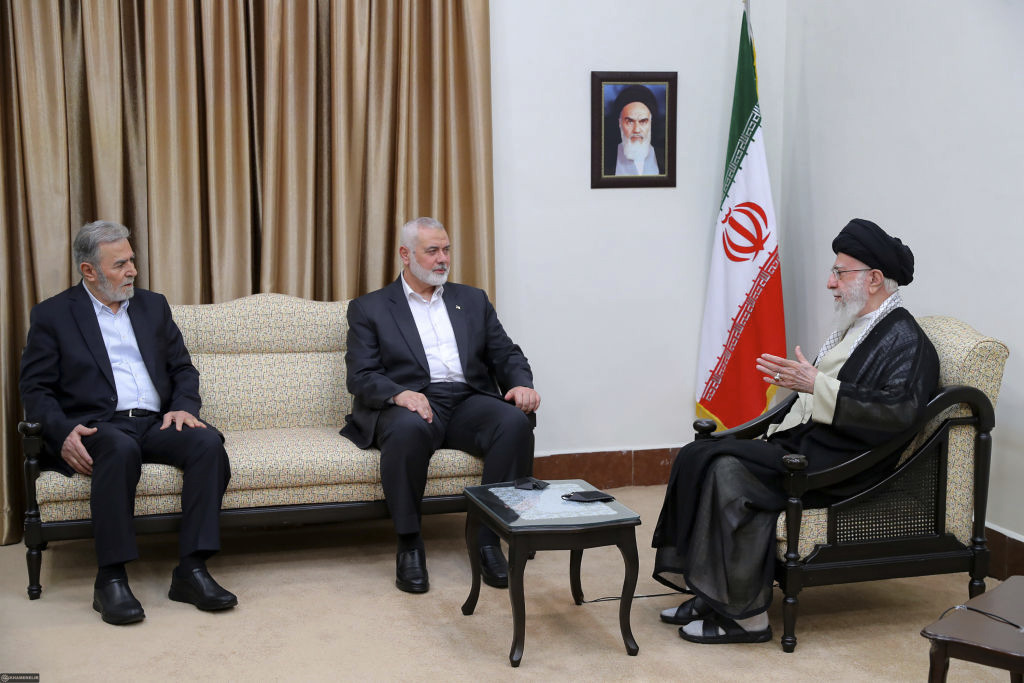 The Iranian regime's sudden willingness to negotiate following Donald Trump's reelection is nothing more than a tactical maneuver. It seeks to buy time, stave off tough sanctions, and delay decisive action while advancing its nuclear program, while waiting out Trump. A deal with the devil will only fuel its destructive ambitions and jeopardize global security. Pictured: Ali Khamenei, the Supreme Leader of Iran, meets with Ismail Haniyeh, then leader of Hamas, and Palestinian Islamic Jihad leader Ziyad al-Nakhalah, on July 30, 2024 in Tehran, Iran. (Photo by the Iranian Supreme Leader's Press Office via Getty Images)
The Iranian regime's sudden willingness to negotiate following Donald Trump's reelection is nothing more than a tactical maneuver. It seeks to buy time, stave off tough sanctions, and delay decisive action while advancing its nuclear program, while waiting out Trump. A deal with the devil will only fuel its destructive ambitions and jeopardize global security. Pictured: Ali Khamenei, the Supreme Leader of Iran, meets with Ismail Haniyeh, then leader of Hamas, and Palestinian Islamic Jihad leader Ziyad al-Nakhalah, on July 30, 2024 in Tehran, Iran. (Photo by the Iranian Supreme Leader's Press Office via Getty Images)
The possibility of negotiating a deal with Iran has resurfaced. Reports suggest that the Islamic Republic's leaders are expressing a willingness to engage with the incoming US administration after Donald J. Trump assumes office.
Reaching a deal, however, with a regime actively waging proxy wars against Israel, most of the Persian Gulf States and the United States -- and that is arming Russia in its war on Ukraine -- would be a monumental error.
Such an agreement would not only bolster the regime financially, but also grant it global legitimacy. That renewed strength would only once again fuel Iran's aggression, further destabilize the region, and embolden its revolutionary ambitions. Negotiating with a regime steeped in terror would simply serve to expand its reach and strengthen its resolve.
History provides a clear warning against such actions. In 2015, President Barack Obama's nuclear deal, which granted Iran the opportunity to build as many nuclear weapons as it is able to, marked the beginning of a dangerous trajectory.
Once sanctions against Iran were lifted, the country gained access to global markets and unprecedented financial resources. This newfound revenue was used not to improve the lives of ordinary Iranians, but to strengthen the regime's proxies and militias across the region. Iran's influence grew dramatically in Syria, Iraq, Yemen, Lebanon and Gaza -- and accelerated its nuclear and military advancements.
The Biden administration continued Obama's lenient policies, enabling Iran to reach new heights of aggression, as evidenced by its ongoing war against Israel, including direct ballistic missile attacks, and its military support for Russia.
The Iranian regime's sudden willingness to negotiate following Trump's reelection is nothing more than a tactical maneuver. It seeks to buy time, stave off tough sanctions, and delay decisive action while advancing its nuclear program, while waiting out Trump.
This is a familiar strategy, designed to outlast the Trump administration and neutralize any efforts to hold the regime accountable. Such deceptive overtures must be recognized for what they are — a fake truce to secure the Islamic Republic's survival and expansion.
Understanding the ideological foundation of the Iranian regime is crucial to grasping its true intentions. Iran's government is not a conventional one, but a revolutionary, fundamentalist regime, wholly committed to spreading its Islamist ideology worldwide.
Iran's constitution explicitly outlines its mission, stating:
"The constitution provides the necessary basis for ensuring the continuation of the revolution at home and abroad. In particular, in the development of international relations, the constitution will strive with other Islamic and popular movements to prepare the way for the formation of a single world community."
These are not mere words; they reflect the regime's unwavering commitment to its ideological mission.
Iran's constitution even frames this mission as "jihad," explicitly stating:
"The Army of the Islamic Republic of Iran and the Islamic Revolutionary Guards Corps ... will be responsible not only for guarding and preserving the frontiers of the country but also for fulfilling the ideological mission of jihad in God's way; that is, extending the sovereignty of God's law throughout the world."
The founder of the Islamic Republic, Ayatollah Ruhollah Khomeini, left no room for ambiguity, declaring:
"We shall export our revolution to the whole world. Until the cry 'There is no god but Allah' resounds over the whole world, there will be struggle."
These statements unequivocally reveal the Iranian regime's ambitions. The West must stop deluding itself into believing that any deal with such a country can succeed.
This commitment to revolutionary Islamist domination at any cost was further emphasized by Khomeini when he chillingly proclaimed:
"We do not worship Iran, we worship Allah. For patriotism is another name for paganism. I say let this land [Iran] burn. I say let this land go up in smoke, provided Islam emerges triumphant in the rest of the world."
These declarations leave no doubt about the regime's unyielding ideological mission and its willingness to sacrifice its own people and land for global conquest.
It is crucial not to fall into the trap of believing that Iran's regime has genuinely changed or that negotiations can yield positive results. History has repeatedly shown that deals with such a predatory regime only serve to empower it. The only effective approach is one of unwavering sanctions, relentless pressure, maintaining a military option and supporting the efforts of most of the Iranian people, who are desperate for a new form of government. Negotiating with an Islamist regime that thrives on terrorism and deception is not just naive— it is dangerous. A deal with the devil will only fuel its destructive ambitions and jeopardize global security.
Dr. Majid Rafizadeh, is a scholar, strategist and advisor, Harvard-educated analyst, political scientist, board member of Harvard International Review, and president of the International American Council on the Middle East. He has authored several books on the US Foreign Policy and Islam. He can be reached at Dr.Rafizadeh@Post.Harvard.Ed

 By Gatestone Institute | Created at 2024-11-30 10:05:53 | Updated at 2024-11-30 12:37:42
2 hours ago
By Gatestone Institute | Created at 2024-11-30 10:05:53 | Updated at 2024-11-30 12:37:42
2 hours ago








